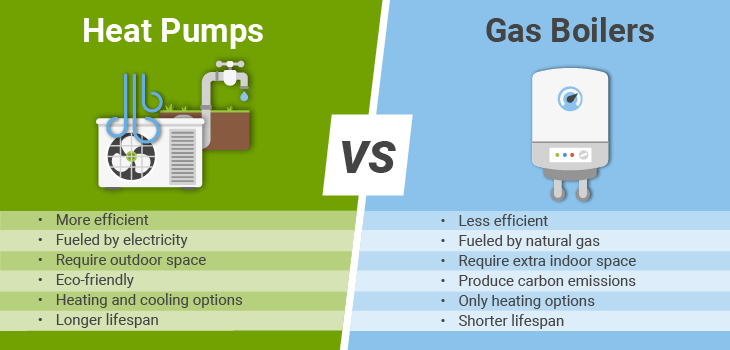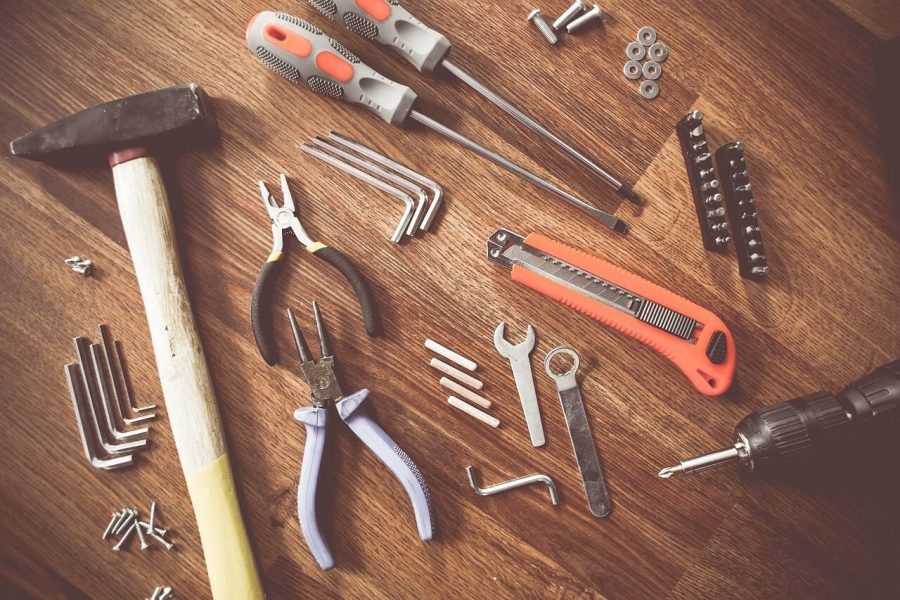Air Source Heat Pump vs Gas Boiler: Which is Better for Heating Your Home?
Complete Solar Ltd, Renewable Energy InstallationsRead it in 8 minutes
 1200
627
1200
627
Read it in 8 minutes
An air source heat pump and a gas boiler are two different technologies for heating your home and providing hot water.
An air source heat pump extracts heat from the outside air and uses a refrigeration system with a compressor and heat exchanger to concentrate that heat and raise it to the temperature needed for heating and hot water. The system runs on electricity.
A gas boiler burns natural gas to heat water that is then circulated around radiators and for hot water taps. The boiler requires a flue for exhaust gases.

When choosing between an air source heat pump and gas boiler, there are a number of factors to consider:
We’ll weigh up these key factors to help homeowners decide which is the better choice for their home heating system. The pros and cons of both technologies will be explored in detail.
The upfront cost is often the deciding factor for many homeowners when choosing between an air source heat pump and a gas boiler. Air source heat pumps tend to have a higher upfront cost, with the heat pump unit and installation costing between £7-11K.
This is quite a bit more expensive than a gas boiler which can cost between £1,500 to £4,000.
The exact costs depend on the size of your home and complexity of the installation. But generally an air source heat pump system will cost around 1.5 to 2 times more than a gas boiler upfront. However, lower running costs make up for higher initial expenditure over time for heat pumps.
Running costs between air source heat pumps and gas boilers can vary quite a bit depending on the weather.
In milder weather, an air source heat pump will be more efficient and cost effective to run. This is because heat pumps use electricity to move heat rather than generating it directly like a gas boiler does. When it’s warmer outside, there is more ambient heat for the pump to collect and concentrate inside your home. This makes it very efficient.
But, in extremely cold weather an air source heat pump will have to work much harder to collect heat. This can increase electricity usage and make it more expensive to run than a gas boiler.
However, modern heat pumps have become more advanced in recent times and can operate efficiently even during the coldest periods of a UK winter.
Gas boilers provide consistent heating performance year-round. However, their running costs are dependent on the price of gas which has skyrocketed over the past couple of years in the UK.
Heat pumps are far more environmentally friendly than gas boilers.
They run on electricity, which can be generated from renewable sources like wind and solar. Even when powered by the grid which uses some fossil fuels, heat pumps still produce around 1/3 the carbon emissions of a gas boiler per unit of heat.
This is because gas boilers directly burn natural gas, a fossil fuel, to generate heat. The chemical process of combustion releases significant amounts of carbon dioxide into the atmosphere.
So for anyone concerned about their home’s impact on the environment and climate change, a heat pump is the clear winner over a gas boiler in terms of carbon emissions.
When discussing efficiency, it’s important to look at the coefficient of performance (COP) rating. The COP measures how much heat a system produces per unit of energy input.
For air source heat pumps, the COP will vary based on the temperature outside. It’s usually around 3-4, meaning for every 1 unit of electricity input, it provides 3-4 units of heat energy output. This makes them much more efficient than gas boilers.
Gas boilers have a fixed efficiency rating and their COP averages 0.9.
So overall, air source heat pumps can be over 300% more efficient than even the highest efficiency gas boilers.

Air source heat pumps generally require less servicing and maintenance than gas boilers due to the fact they have fewer moving parts.
As long as the outdoor unit is kept clear of debris and vegetation, there is minimal maintenance required, other than the filters needing changing every 6-12 months.
Gas boilers have more components that need servicing – the heat exchanger, burner, gas valve, flue, expansion tank, pump etc. Most gas boilers need an annual service to remain safe and efficient.
The lack of moving parts and simpler system means an air source heat pump should run for many years without issue. They don’t require an expensive annual service. But when repairs are needed, they may be more complex than a standard gas boiler due to the electrical components and refrigerant system.
Overall, an air source heat pump wins when it comes to minimal maintenance requirements. Just some simple filter changes and keeping the outdoor unit clear.
Air source heat pumps have an external unit that needs to run to produce heat. It makes noise when it’s running that is similar to the sound of an air conditioning unit.
The noise level can range from 35-55 dBA depending on the size of the heat pump and how hard it is working to produce heat. This can be an annoyance for some homeowners, especially if the external unit is located close to windows. Quieter models are available, but they usually come at a higher price.
Gas boilers are much quieter overall since they don’t require an external unit. The only noise from a gas boiler comes from the water heating up and the circulation of the water through the pipes in your home. This tends to blend into the background and is not very noticeable.
The constant noise from an air source heat pump compared to the minimal noise from a gas boiler could be a factor for homeowners who value peace and quiet. Proper placement of the external heat pump unit will help reduce noise, so when having a heat pump installed, this is an important consideration when you’re talking to your supplier.
When comparing the lifespan of an air source heat pump vs a gas boiler, the heat pump is likely to last significantly longer. The heat exchangers and compressors in a heat pump will typically last 20-25 years, sometimes longer if properly maintained. Gas boilers tend to last 10-15 years on average before needing full replacement.
This difference is because a gas boiler contains more mechanical parts which wear out or fail over time. Heat pumps have fewer parts that need replacing. As long as the heat pump is kept in good working order, the main components should last for decades.
So if looking at the long term, an air source heat pump will probably outlast at least two gas boiler replacements. This makes the lifespan an advantage of heat pumps over gas boilers. Just be sure to work with qualified technicians who are experienced with heat pump maintenance and repairs. With proper care, a heat pump can provide effective and efficient heating for 20 years or more.
When it comes to the space required for each system, there are some key differences to consider.
An air source heat pump is located outside your home. It’s about the same size as an air conditioning condenser unit. This means no indoor space is required other than some minor ductwork. A small indoor unit may also be needed, which is typically wall-mounted.
A gas boiler on the other hand requires dedicated space indoors for the boiler unit itself as well as any auxiliary equipment like a hot water tank. The boiler will need to be installed in an area with adequate ventilation, typically a basement, utility room or garage. This can take up valuable living space in some homes.
Overall, an air source heat pump has a clear advantage when it comes to space requirements, since all of the main equipment sits outdoors. There is no large boiler unit taking up room inside your home. Just the minor addition of some ducts and a small indoor air handler unit is needed. This makes an air source heat pump ideal if you have limited indoor space available.
When weighing up installing an air source heat pump or gas boiler, there are several key factors to consider.
On the pros side for heat pumps:
However, heat pumps also have some cons to be aware of:
For gas boilers:
But the cons include:
As electricity grids continue to decarbonize, heat pumps could become the preferred choice in the future for their energy efficiency and low carbon benefits. There can be a high initial investment, but the longer term savings will offset the upfront cost.
Sold on the benefits of heat pumps? If you’d like to find out more about having an air source heat pump installed get in touch to discuss your requirements.
Get in touch for an installation estimate and we'll get back to you
Contact us